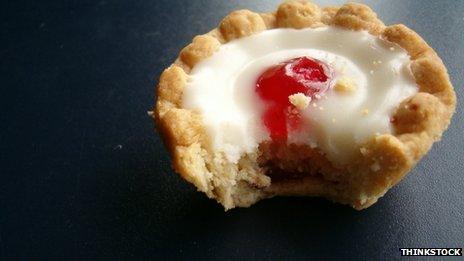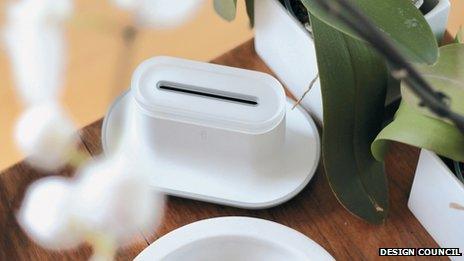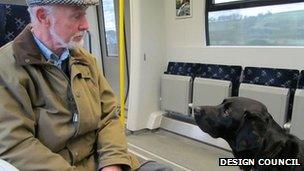Bakewells and dogs vs dementia
- Published

The drifting smells of a Bakewell tart, guide dogs for the mind and hi-tech wristbands could all have a future in helping people with dementia.
They are some of the winners of a competition by the Design Council and the Department of Health to develop new ideas in care.
The winners are all prototypes, but the aim is to produce them on a mass scale.
David Cameron has described dementia as a "national crisis" which affects 800,000 people in the UK.
The slow death of the brain in dementia affects memory, language and understanding. One of the problems can be forgetting to eat, which is what one of the design ideas is trying to overcome.
The "Ode" project works on the same principle as smells wafting from the kitchen making you hungry. It pumps fragrances of food into the air to whet the appetite of people who are not eating.
Lizzie Olstrom, who is part of the design team, told the BBC: "So much of appetite is about smell, the sensory anticipation of food. [Ode] uses fragrances to re-awaken appetite."
So far they have used smells of a Bakewell tart, citrus and spices. However, the tempting aroma of fish and chips has not translated so well. "Would you want vinegar and wet paper smells in the house?" she asked.

The "Ode" prototype
So far, she said the product had "compelling results" after being tested in homes. However, larger-scale tests will be needed to see if the product really helps people.
Man's best friend
Specially trained "dementia dogs" was also a winner.
The idea is to train the dogs with the patient and their carer before the symptoms become too severe.
Jeni Lennox, from Dementia Dogs, said: "In dementia, routine disintegrates. Dogs are a creature of habit."
The dogs will be trained to keep the routine going by bringing medication, water, waking the person up and taking them to the toilet.
She said: "A dog is a real aid in social interaction. People with dementia can become socially isolated, a dog acts as a bridge to the community."

Dementia Dogs was one of the five winning ideas
A hi-tech wristband called "Buddiband" is another prototype which caught the eye of the Design Council. It can detect a fall and call for help as well as keep an eye on the wearer's activity levels.
The two other victors in the competition use the internet to help make life easier. Grouple is a social network which helps families share and organise caring for a relative with dementia, while Trading Times is an online service which helps carers find part-time work by matching them up with local businesses.
The chief executive of the Design Council, David Kester, said: "A consequence of an ageing population is a threefold increase in dementia over the past 20 years.
"That means there are many millions of people who need new products and services designed to meet their changing needs. This project demonstrates that if you put the people who are living with dementia, including carers, at the centre of the design process, you end up with rapid and inspiring innovation."
Prof Alistair Burns, the national clinical director for dementia, said: "I have no doubt that the prototypes shown today could have a major positive impact on quality of life, continuity of care and the wellbeing of those with dementia."
The care services minister, Paul Burstow, said: "Fear of dementia can leave people feeling powerless and trapped, leaving them isolated and unsupported. That is why we have worked with the Design Council to drive innovation in dementia care.
"The five winning ideas have the potential to make a big difference for people with dementia and their families."
- Published26 March 2012
- Published16 February 2012
- Published10 April 2012